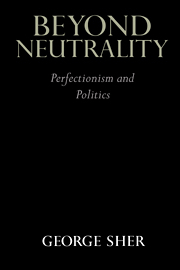9 - Perfectionism: A theory
Published online by Cambridge University Press: 14 November 2009
Summary
The perfectionist theory that I shall defend is pluralistic in one sense but monistic in another. It is pluralistic in the sense that it attaches value to a number of irreducibly different activities, traits, and types of relationship, but monistic in that it traces the value of each to a single source. Thus, in the terms of a distinction made earlier, mine is a theory of inherent rather than intrinsic value. To develop the theory, I shall proceed in three stages. First, I shall present a list of candidate goods that seems initially plausible. Next, I shall sketch a unifying account that, if defensible, would justify each entry on the list. Finally, I shall defend that unifying account on independent grounds.
As I argued in the preceding chapter, there are various traits and activities about whose value most would agree. For example, few would deny that it is good to possess knowledge and insight, to excel at what one does, to display various virtues, and to stand in close and loving relations. But many other claims about the good are far more controversial. Some regard promiscuity and homosexuality as abominations; others attach great value to aesthetic appreciation; still others locate the good in direct civic participation; and others again think it best to live in harmony with nature. In each case, many strongly disagree. Similarly, many people do, but many others do not, attach special value to intellectual activity, physical activity, self-expression and spontaneity, self-control, balance, and excess.
- Type
- Chapter
- Information
- Beyond NeutralityPerfectionism and Politics, pp. 199 - 244Publisher: Cambridge University PressPrint publication year: 1997



